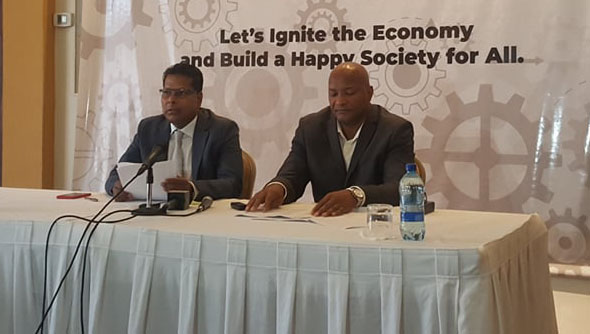Change Guyana Presidential candidate Robert Badal on Tuesday clarified his party’s position on a possible renegotiation of the 2016 Production Sharing Agreement (PSA) with ExxonMobil saying that an expert analysis and recommendations on all contracts would guide the way forward were it to get into office.
During an interview with this newspaper on October 24, Badal had reasoned that given that Guyana was a frontier country when the PSA was negotiated in 1999, this country could not have asked for much or it risked the company walking away. He said that only “subsequent” contracts would be renegotiated but that an expert team would do an analysis and recommendation on all contracts.
“A country that had no petroleum history, we only detected the reserve in 2015 and it was difficult to get the best deal at that time [and could not ask for much].
“If you insisted on too many hard policies, then you might not get investors because it was a massive unknown there, but as things progress, I am inclined to believe that we will get better contracts, “ Badal had told Stabroek News.
Critics have said it is not the 1999 agreement with ExxonMobil subsidiary EEPGL which was unacceptable but the post-oil PSA of 2016 which enlarged the exploration period for the company and contained the much criticized signing bonus.
When the party was launched on October 29, prime ministerial candidate Nigel Hinds was firm in his view that the party’s position would be to see an analysis of all contracts and he believed that would lead to at least an increase in the royalty amount. Hinds had been strongly critical of the ExxonMobil deal in letters to the newspapers.
On Tuesday, Hinds said “During the interview (October 24) you had with Robert, I was present and my takeaway was that what he said several times was the need to use international experts to review the contract or inform decisions going forward. Of course I made more direct statements. Our position is that we will hire a reputable firm of international lawyers to go through the process of renegotiation, negotiation or review. It is just the terminology. In Guyana, renegotiation has become almost like a harsh and word that is somehow hostile. But we are pro investors, we are in favour of investors. The presence of Exxon here, my personal view, is that was the one oil company in the world that I would like to do business with in Guyana; that the Guyanese people can have partnership with,” he said.
“The controversy (over the Exxon deal), the vague statements, the lack of transparency whether it was related to the signing bonus or when the contract was released it caused great dissent and concern among the Guyanese public. As a responsible party, we cannot just set that aside and you know, be like Benedict Arnold and say we are not going to look at that deal,” he added, while pointing out that the possible renegotiation will involve four phases.
The first of those stages, according to Hinds, would be thorough preparation where the analysis is undertaken. “Preparation- it doesn’t mean it will end up in bargaining. This is with the international experts and the international public law firm. It is based on when they do their research, then they can come and say we need to go bargaining or they can say otherwise,” he said.
Badal on Tuesday said that the party would be making a further statement on the issue and that would be its position. “I was surprised, when the headline (on October 29) said that I said no renegotiation but when you look at the contents, it conflicts with the headline. We would be putting a statement … to clarify all those points,” he said.
“The issue is, moving forward we have to set the principle. We don’t know what transpired before. We are reacting to the public concern as Nigel is talking about. Whether we say renegotiate, or look, or work with the investor over time to have a better deal. The principle is that we will work with all investors so that we have a better deal going forward. Benefit for Guyanese is not only the royalty, is not only the share. It is things like local content, giving preferences to Guyanese businesses, training Guyanese so that in the long term Guyanese benefit all over Guyana…,” he added.
He believes that the main issue as it pertains to contracts and oil has to do with leadership and who spearheaded those contracts. “The main issue confronting Guyana today concerning oil contracts is the leadership. I think we should focus on leadership because it was a failure of leadership, in getting proper advice by looking at our experience… then get international experts…these are the issues, rather than say blankly, negotiation or renegotiation,” he said.
“It is important that people understand the plans of each party, even though we must understand that plans change over time as events unfold. We would engage the best industry experts. The way I do things is that I engage the best in a particular field until I build my knowledge. I did the same for the hotel, I did the same for feed (selling). We will mandate that the group that will advise us will have to look at these contracts and find out if we could have gotten a better deal. Whatever recommendations is made then, will form the basis of the actions that we will take”, Badal had explained on October 24.
He said that the issue of the contract with ExxonMobil and partners is a genuine concern for the people of this country as oil will make a significant impact on development, while it lasts.
The Change Guyana presidential candidate said that he will first implement measures so that this country’s citizenry “better understand the dynamics of the industry”, even as it gives it support to investors coming here.






